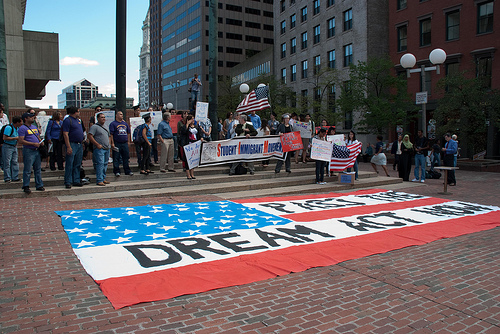Words have never been enough. While the brain can process thousands of feelings and sensations every minute, spoken language will forever be a bottleneck that retards the sharing or expression of sensations from one person to the next. Think about it – how often are you left struggling to relay a thought to a colleague or friend? Our ancestors responded to this impasse by developing ways to squeeze through the barriers of communication. For as long as humankind has roamed the earth, the arts have existed as a prominent feature in human relations. Painting, literature, theater, and music were created as ways to get around the limits of language. Though seemingly extraneous to survival, the arts represent an evolutionary step that separated the struggle to survive from the struggle to understand. Music, from its time as rudimentary grunting and stick-banging and onto its contemporary mass produced, auto-tuned form, has been a way of relaying the full spectrum of emotions. Helping us to connect, understand, and express, music’s role in our lives serves a much deeper purpose than purely entertainment.

The presence of music in modern politics cannot go unacknowledged. Politics frequently intersects with music. As politics boils down to the determination of who gets what, many artists take to the airways to state their societal aspirations, either enthusiastically or subtly. What better way to express your idea of a utopian society than to sing about it for the masses to hear? Why waste an audience? It may also provide solution for artists with legitimacy crisises who, wanting to shed the persona of a pop prince or princess, take up a message to provide a foundation for their artistry.
Dissect most songs and you will surely find a political statement. Do you like John Lennon? Listen to his song “Imagine.” Prefer more recent tunes? Download Green Day’s 2005 “American Idiot,” which had Generation X-ers rocking to the lyrics “Don’t wanna be part of a redneck’s agenda.” Anyone want to guess who they are referencing? Rap, which many contend is a smattering of misogynistic hate speech that glorifies violence and breaking the law, has its share of political statements. The eighties rap group N.W.A. helped expose what they perceived as deeply imbedded racism within the greater Los Angeles community. Their lyrics reflected the angst of young Americans who not only believed that the needs of their communities were being passed over, but were troubled by experiences of police brutality, racial profiling, and a lack of economic opportunities. With their enormous success, these pioneers of the “Gangsta Rap” music genre would surely argue that their music ultimately led to steps to eliminate such inequities. Without music as a forum, these young men would have likely been dismissed by the masses as troubled “gangbangers,” who’s complaints were illegitimate. The unlikelihood of Dr. Dre and Ice Cube rolling up to a selectman’s meeting, meant that the public would not receive their message in a traditional way- music interceded.
Hip hop artist Lil’ Wayne, on his way to Grammy stardom, sang passionately against what he perceived as the government’s neglect of his home town, New Orleans, following Hurricane Katrina. Upon the election of Barack Obama as the 44th President of the U.S., at least one rapper had lyrics which included “my president is black.” All of these statements are inherently political in nature. They are points of view on society and government that to some are acceptable, while at the same time unacceptable to others. They span many frontiers from foreign wars down to municipal policies, religion, and even sometimes education. And who, after listening to enough rap would argue that a preponderance of these men and women are against the promotion and legalization of marijuana as well as other banned substances? Tales of drug use are seemingly an integral part of this genre.
In terms of the social structure of the United States, many artists orient their content toward celebrating diverse lifestyles and castigating those who oppose or attempt to stand in the way. Pink, The Black Eyed Peas, as well as many more artists take up this sort of role. Artists present to the public music videos where homosexual or interracial couples are celebrated. While these tend to be less prevalent among mainstream artists, Christina Aguilera is one noteworthy example with her record “Beautiful.” Additionally more and more music incorporates scenes depicting what the producers consider to be the hurtful nature of some of society’s tendencies, particularly those associated with superficial standards of appearance and gender roles.
It soon becomes clear that most songs tend to have a liberal bent, but Toby Keith went against the grain with his own message. In one of his anthems for American pride, he sang, “We’ll stick a boot up their ass, it’s the American way!” He and other country music stars often incorporate what are considered pro-America, pro-military statements, with emphasis on maintaining the traditional American culture. Music is becoming less art and more controversy.
The fact is that music is now being utilized as the means for social advocacy and change, perhaps more than ever before. Whether or not this is needed or valuable social change is irrelevant to this conversation. What might appear as innocent songs can carry unspeakable power. People do not realize that the music they listen to casually on the radio or their iPods while exercising, walking to class, or lying in bed, amounts to the incursion of someone’s beliefs and point of view on the listener’s own mind. While you are concentrating on completing the last set of leg lifts at the gym, playing in your ears could be strong political statements that can and do affect the way you think. Those seeking entertainment are unwittingly exposed to biased and persuasive material, what some might categorize as industry-sponsored propaganda. While not wholly subliminal, these messages can crawl imperceptibly through our ears and plant themselves into the decision making portion of our minds.
Who sponsors the musical content that we hear every day? Given the innerworkings of the nation’s corporate recording industries, it is not conspiracy theory to say that massive record labels wield great power in determining which songs, and therefore which messages, filter into our ears. Talent alone won’t get you on the Billboard charts. Dozens of people play a role in crafting and shaping popular music, long before it finally enters your ears. Keep in mind that what you hear has been censored.
Be warned about the subconscious power that constant repetition of music will have on the formation of our own beliefs. Songs celebrate individuality, something that sits in contrast from community life. They speak of the wonders of cities, which promotes urbanization. Again, this isn’t about whether the message is relatively good or bad for the listener. They speak about the degradation of the environment, which promotes conservation. Are you sure that Toby Keith is well read in Middle Eastern affairs? Are his statements oversimplifications and unrealistic? This issue is about music lovers being shaped by their music, which they likely hadn’t planned on, as they may just listening to the song because it was in the top ten on iTunes. I’m all for music that promotes a discussion. It’s only when there is an awareness of the situation that such discussion can occur. Otherwise it’s Bono making a statement and you listening unabashedly. To say that these lyrics do not truly affect people is to underestimate the power of persuasion. Songs are hardly ever two sided. We need to distinguish between an artists’ narcissistic need to be edgy from genuine expression about a fundamentally political or societal matter. We can’t let the ethos of a celebrity overcome our intellect.
We constantly scrutinize news anchors and reporters who tell us what is going on in the world, newspaper editorialists who tell us what to think, or parents who advise us on all of life’s matters. We don’t, however, scrutinize our music. Music slips through as art and entertainment, when a large portion of the lyrics are politically influential. Music is frequently a forum to unleash one’s angst. We should be sure to evaluate the purveyors of political messages in song lyrics as well as the sources or motivations of their angst before they are accepted as reputable sources.
These issues are not anecdotal or harmless. They are so pervasive that we should learn to filter ourselves, so as not to unknowingly infect ourselves with whatever comes with a catchy tune. We must be wary of artists who attempt to use their fame to perpetuate a certain message, like we would anyone else in media. We must realize that although we may like the song, we should not necessarily equate the same liking to its politically driven content.
For clarifications sake, I’m all for artists who stand for a cause. We all get sick of cookie-cutter artists singing manufactured songs to a bubble gum beat. In fact I tend to be against artists who do not take personal ownership over their works, or who say that their content it’s for the people’s interpretation, thereby lacking an intended message. If they are going to support a message they should stand by it, and if an interpretation of a song is not what they intended they should at least say as much.
Sorry current and aspiring musicians, but you are not who I turn to for my political opinions. These people are free to use music to make a political statement — and why shouldn’t they, especially if it sells? As a public we must recognize that this is not the best place to get information. We should not confuse recreation and fun with a class on civics. When songs blow up the charts and become iconic, we take the gained legitimacy of the song and apply it to its political message, which may or may not be valid. We let our investment in musical fare taint a whole different and unrelated aspect of our lives. If political activism impels you, Kanye, a recent participant in We Are the World 25 for Haiti, why not separate it from you music and speak about issues for longer than a chorus?
The solution is not to ban political music or to stop listening to it; their politics may very well be your own politics. The solution is to be critically aware of what you are listening to, its potential effect on you and how you get to know the facts. People should resist allowing the cult of celebrity to determine how they feel on issues. Lastly, music should stay more toward the entertainment end of the spectrum, and less toward the political manifesto end, where Locke, Montesquieu and Marx occupy space. Some of us like music that has a message and rails against sappy love songsor sexually explicit rock and roll. I challenge you to remain cognizant of the music you hear and how it is intended to persuade you. Then after that, I urge you to just enjoy it!



